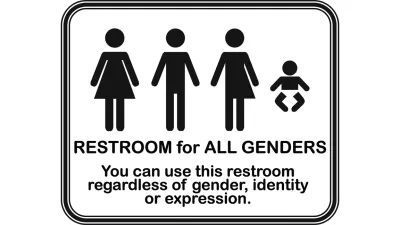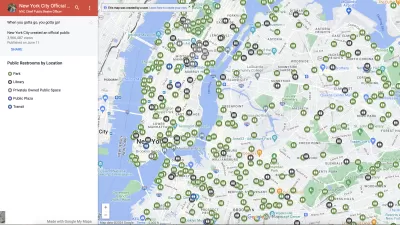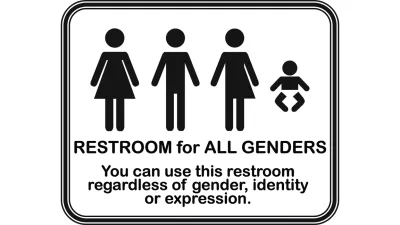There are several reasons that gender neutral bathrooms will soon replace separated men's and women's bathrooms, and they have nothing to do with gender identity, explains Jimmy Parker, event producer and former BID director.

Gender neutral bathrooms are just better. It has nothing to do with gender identity or current affairs. There are several reasons that gender neutral bathrooms will soon replace separate men's and women's bathrooms, explains event producer and the long time president of San Diego's Gaslamp Quarter Association—a Businsess Improvement District. A few of the reasons include:
Benefits
Once you begin to design standardized approaches to public restroom facilities, certain benefits will be realized. Here are a few:
- No need to calculate use based on demographics.
- No duplication of hand wash stations, signage, lighting, and general access corridors
- Easier family use (Fathers with daughters, Mother with sons)
- Easier calculation/conformance with ADA standards
Safety
This area seems to be where the greatest passion exists on both sides of the political debate, but I would ask the reader to consider the following:
- Unisex restrooms (shared areas) are easier to patrol with security personnel. With separate facilities, sex-specific guards need to be available to respond to emergencies/concerns.
- Greater traffic increases safety. The potential of swifter response to inappropriate behavior is a great deterrent.
- Children can be accompanied by both parents/grandparents. Especially important with multiple children.
- Stalls, unlike urinal dividers, can be re-enforced to provide better (not complete) protection when people need to shelter in place during violent incidents.
Parker concludes by asking planners and municipalities to remove remove regulatory obstacles to their implementation and to develop standards to allow all large scales public projects to have gender neutral bathroom facilities.
FULL STORY: A Planner’s Opportunity – Gender Neutral Facilities

Manufactured Crisis: Losing the Nation’s Largest Source of Unsubsidized Affordable Housing
Manufactured housing communities have long been an affordable housing option for millions of people living in the U.S., but that affordability is disappearing rapidly. How did we get here?

Americans May Be Stuck — But Why?
Americans are moving a lot less than they once did, and that is a problem. While Yoni Applebaum, in his highly-publicized article Stuck, gets the reasons badly wrong, it's still important to ask: why are we moving so much less than before?

Using Old Oil and Gas Wells for Green Energy Storage
Penn State researchers have found that repurposing abandoned oil and gas wells for geothermal-assisted compressed-air energy storage can boost efficiency, reduce environmental risks, and support clean energy and job transitions.

Greening Oakland’s School Grounds
With help from community partners like the Trust for Public Land, Oakland Unified School District is turning barren, asphalt-covered schoolyards into vibrant, green spaces that support outdoor learning, play, and student well-being.

California Governor Suspends CEQA Reviews for Utilities in Fire Areas
Utility restoration efforts in areas affected by the January wildfires in Los Angeles will be exempt from environmental regulations to speed up the rebuilding of essential infrastructure.

Native American Communities Prepare to Lead on Environmental Stewardship
In the face of federal threats to public lands and conservation efforts, indigenous groups continue to model nature-centered conservation efforts.
Urban Design for Planners 1: Software Tools
This six-course series explores essential urban design concepts using open source software and equips planners with the tools they need to participate fully in the urban design process.
Planning for Universal Design
Learn the tools for implementing Universal Design in planning regulations.
Heyer Gruel & Associates PA
City of Moreno Valley
Institute for Housing and Urban Development Studies (IHS)
City of Grandview
Harvard GSD Executive Education
Salt Lake City
NYU Wagner Graduate School of Public Service
City of Cambridge, Maryland




























